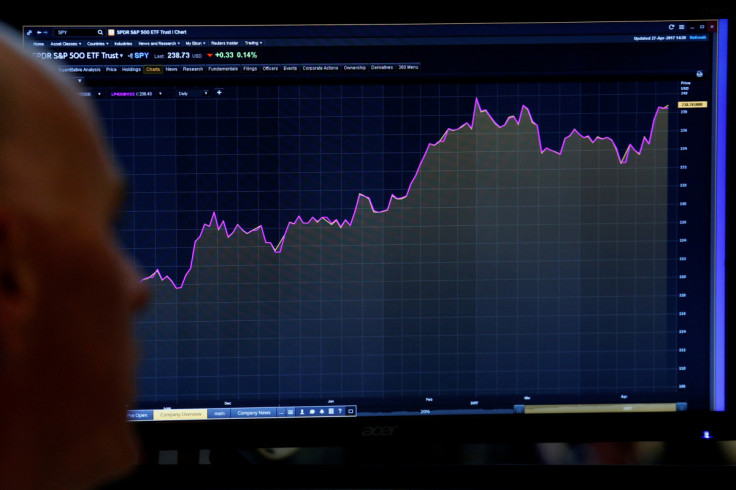Stocks Get A Boost From Retail Sales, Oil And Arm IPO

The U.S. stocks got a significant boost from a rebound in retail sales and hype surrounding the Arm IPO on Thursday.
In early afternoon trade, the S&P 500 was up 0.84%, the Dow Jones up 0.93%, and the tech-heavy Nasdaq up 0.88%.
Traders and investors were encouraged by the release of a report by the U.S. Census Bureau before the market opening, which showed that sales increased by 0.6% in August from the previous month.
That's well ahead of market expectations of 0.2%, confirming that consumer spending –roughly two-thirds of the U.S. Gross Domestic Product (GDP) – remains robust despite high interest rates and consumer debt levels.
Sales gains were led by gasoline stations (5.2%) due to soaring gasoline prices, clothing stores (0.9%), and appliances (0.7%), as sales of other consumer goods like food lagged. As a result, retail stocks like Costco and Amazon and oil stocks like Exxon Mobil led the gains.
Adding to the positive sentiment of solid retail sales was the Arm Holdings IPO, which reinforced the hype over the semiconductor and the A.I. stocks.
Jill Blanchard, president of Enterprise Client Solutions at Advantage Solutions, provides a good insight into retail sales.
"While the August figures show overall growth in the sales numbers, much of that growth comes from gas sales while other categories, such as grocery, show some weakness compared to the prior month," Blanchard told the International Business Times. "The reintroduction of student loan payments this month will also impact consumer spending in future months."
Meanwhile, investor enthusiasm for U.S. equities may be tempered by a couple of inflation and interest rate developments.
On the inflation front, two price gauges, the Consumer Price Index (CPI) and the Producer Price Index (PPI), which measure inflation at the retail and wholesale levels, gave a mixed picture. On the one side, both the headline CPI and the headline PPI came higher than expected, while the core CPI and PPI, which exclude food and energy from the calculations, came in line with expectations.
Still, Ben Laidler, of eToro, sees mixed messages in recent reports that the U.S. inflation is moving in the right direction.
"While oil prices have driven the headline rate up to 3.7%, this is arguably outweighed by the more important core inflation rate falling to a new low at 4.3% as the housing and jobs markets cool," he told IBT.
Kurt Rankin, senior economist and vice president of the PNC Financial Services Group, is worried about the rise in headline inflation. But he doesn't see it lasting.
"CPI and PPI are joined at the hip regarding U.S. inflationary pressures," he told IBT. "From manufacturers to transportation firms, to retailers, increases in producer costs are invariably passed on to consumers. And while the influence of consumer demand – regardless of producer price trends – has its potential to drive inflation, that connection can be short-circuited depending upon the broader economic environment."
Still, Laidler believes the numbers will still be too high for the Federal Reserve.
"This will force it to keep interest rates at a 20-year high until it sees more progress in the last and hardest yards to get inflation firmly on track towards its 2% target," he added.
Talking about interest rates, the European Central Bank (ECB) hiked interest rates again, increasing the chances that the Federal Reserve will follow suit next week.
"The U.S. economy once again showcased its distinctive resilience," Jon Maier, chief investment officer at Global Xbreaking, told IBT. "Retail sales surged significantly, though labor figures were somewhat softer than anticipated – a development some might interpret favorably. The Producer Price Index (PPI) reported figures higher than expectations, moving the front of the treasury curve higher. Meanwhile, the ECB decided to hike rates amid dimming growth prospects in Europe, leading to a robust U.S. dollar and a declining Euro."
Higher interest rates and a stronger dollar are usually a headwind for equities as they increase the likelihood of the U.S. economy sliding into a recession, hurting corporate earnings.
At the same time, higher interest rates make future earnings less valuable when discounted to the present.
(Correction: An earlier version of this article mischaracterized the quote by Jill Blanchard, president of Enterprise Client Solutions at Advantage Solutions. This was edited for accuracy.)
© Copyright IBTimes 2024. All rights reserved.






















